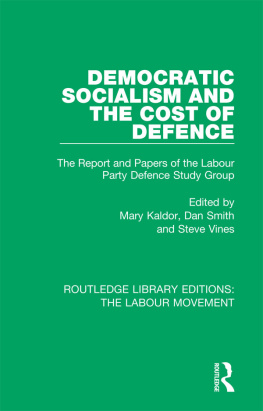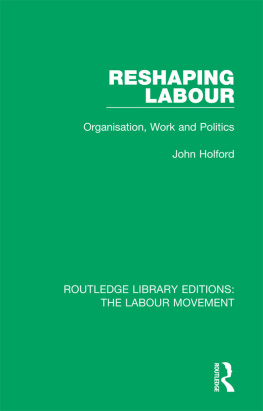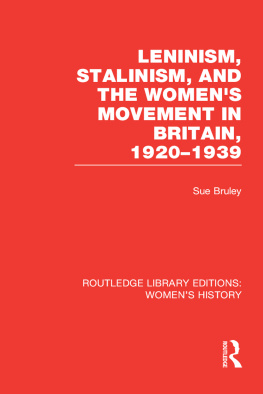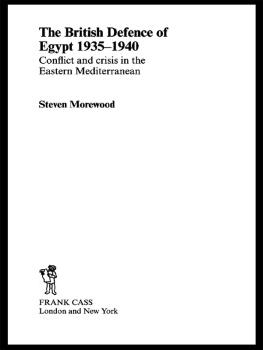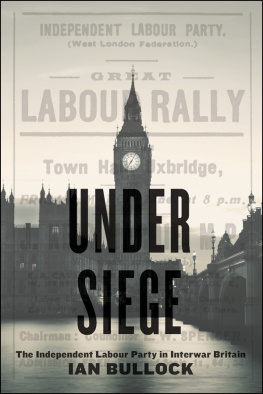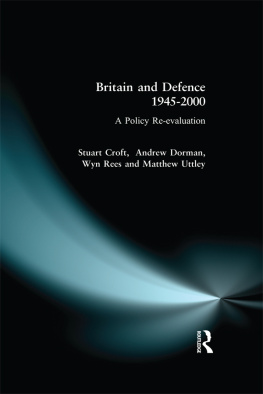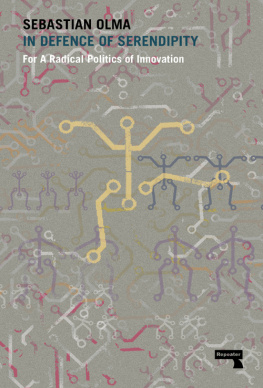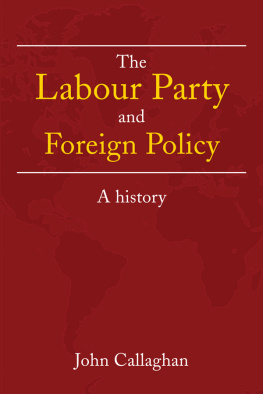ROUTLEDGE LIBRARY EDITIONS:
THE LABOUR MOVEMENT
Volume 20
DEMOCRATIC SOCIALISM
AND THE COST OF DEFENCE
DEMOCRATIC SOCIALISM
AND THE COST OF DEFENCE
The Report and Papers of the
Labour Party Defence Study Group
Edited by
MARY KALDOR, DAN SMITH
AND STEVE VINES
First published in 1979 by Croom Helm Ltd
This edition first published in 2019
by Routledge
2 Park Square, Milton Park, Abingdon, Oxon OX14 4RN
and by Routledge
711 Third Avenue, New York, NY 10017
Routledge is an imprint of the Taylor & Francis Group, an informa business
1979 The Labour Party
All rights reserved. No part of this book may be reprinted or reproduced or utilised in any form or by any electronic, mechanical, or other means, now known or hereafter invented, including photocopying and recording, or in any information storage or retrieval system, without permission in writing from the publishers.
Trademark notice: Product or corporate names may be trademarks or registered trademarks, and are used only for identification and explanation without intent to infringe.
British Library Cataloguing in Publication Data
A catalogue record for this book is available from the British Library
ISBN: 978-1-138-32435-0 (Set)
ISBN: 978-0-429-43443-3 (Set) (ebk)
ISBN: 978-1-138-34834-9 (Volume 20) (hbk)
ISBN: 978-0-429-43670-3 (Volume 20) (ebk)
Publishers Note
The publisher has gone to great lengths to ensure the quality of this reprint but points out that some imperfections in the original copies may be apparent.
Disclaimer
The publisher has made every effort to trace copyright holders and would welcome correspondence from those they have been unable to trace.
DEMOCRATIC SOCIALISM
AND THE
COST OF DEFENCE
THE REPORT AND PAPERS OF
THE LABOUR PARTY DEFENCE STUDY GROUP
Edited by
MARY KALDOR, DAN SMITH and
STEVE VINES
CROOM HELM LONDON
CONTENTS
1979 The Labour Party
Croom Helm Ltd, 210 St Johns Road, London Swll.
British Library Cataloguing in Publication Data
Kaldor, Mary
Democratic socialism and the cost of defence.
1. Great Britain Military policy
2. Disarmament
I. Title II. Smith, Dan III. Vines, Steve
355.033541 UA647
ISBN 0856648868
The report of the Labour Party Study Group on Defence Expenditure, The Arms Trade and Alternative Employment was originally published by Quartet Books as Sense about Defence , London, 1977.
Reproduced from copy supplied, printed and bound in Great Britain by Billing and Sons Limited, Guildford, London, Oxford and Worcester.
The early stages of the Labour Party Defence Study Groups activity greatly benefited from the work of the Groups first joint secretaries, Keith Hill and the late Chris Ralph.
We are also indebted to Dennis J. Nisbet, Member of the Society of Indexers, for compiling the index.
by Olof Palme
World military expenditure today equals almost 400 billion dollars per year. This is more than twentyfive times the amount of money spent on development aid in a world where 570 million people are undernourished, one billion people lack adequate housing and where 70 per cent of the population is still without safe water.
The arms race has now reached such proportions that political leaders everywhere are beginning to realize that, instead of strengthening security, armaments, nuclear as well as conventional, are becoming a threat to the peace and security of the nations involved as well as to the world as a whole. That unbridled bilateral arms races between nations or alliances can create instabilities and tensions and increase the risk of local conflicts escalating up to general war is now commonly recognized.
Not only is the arms build-up a growing threat to world peace, it also represents a tremendous waste of human, material and technological resources in a world plagued by poverty and hunger. At a time when the gap between the rich and the poor countries is widening this situation is intolerable from the point of view of solidarity and justice. Nobody can defend a world order based on such grotesque priorities as those which appear when the amounts spent on armaments are compared with those allocated for development. The special session on disarmament which was held by the General Assembly of the United Nations in Nay/June 1978 may be seen as an expression of the concern felt by the international community about the arms race and its consequences for security and development.
But in spite of a growing awareness of the dangers inherent in the present situation the obstacles to disarmament remain formidable. Thus the current state of international relations with its faltering spirit of detente is hardly conducive to disarmament efforts. Distrust is a powerful promoter of armaments. And we democratic socialists also refuse to acknowledge partition of the world between two immovable and opposing blocs that produce tension and run the risk of dangerous confrontation as a permanent fact of international relations.
In the existing situation, lasting security for the world cannot be achieved merely through equilibrium between the power-blocs on the basis of shared spheres of influence.
Nor can it be brought about by a balance negotiated between the superpowers alone.
The extension of dtente must lead to greater co-operation between nations, thus progressively reducing the sources of conflict and grounds for interventions by the great powers in fields that encroach upon the sovereignty and independence of states.
But there are also the self-generating forces at work within each nation, political expediency, pressures from interest groups and progress within weapons technology.
We all have an instinctive tendency to be conservative in matters of national security. And political leaders are not always encouraged to become more open-minded and far-sighted by the representatives of the bureaucracies, the military-industrial complexes and other organizations connected with national defence, who perhaps not unexpectedly tend to see matters in the light of the more immediate interests of their own organizations and to indulge in worst-case-analysis of the adversarys intentions and capabilities. Under such circumstances the qualitative arms race acquires a momentum of its own and its pace is ultimately only set by the potential for advance within weapons technology. New weapons then see the light of the day, not because they are needed, but because it is possible to develop and produce them. And if there is no strategy for their deployment, a strategy is invented.
Many approaches and technical solutions to disarmament problems can be suggested, but the crux of the matter is that of political will. And the political will to restrain the arms race can and must be supported and reinforced by an enlightened public opinion. I believe that the general public must now be engaged if there is ever to be any progress in arms limitation and disarmament negotiations. And I am certain that such involvement could also make itself felt in social systems where there is no freedom of expression.

